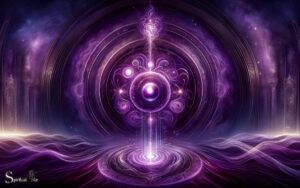What Does a Ram Symbolize Spiritually? Power!
The ram spiritually epitomizes key qualities like leadership, perseverance, and assertiveness. Its presence in various cultural and religious contexts underscores its significance as a symbol of power, fertility, and guidance.
Whether encountered in dreams or as part of ritualistic practices, the ram’s symbolism offers a pathway to personal empowerment and understanding of human attributes.
Discover the layered meanings behind the spiritual embodiment of the ram as we decode its symbolic resonance.

Key Takeaway
Ancient Mythology and Symbolism
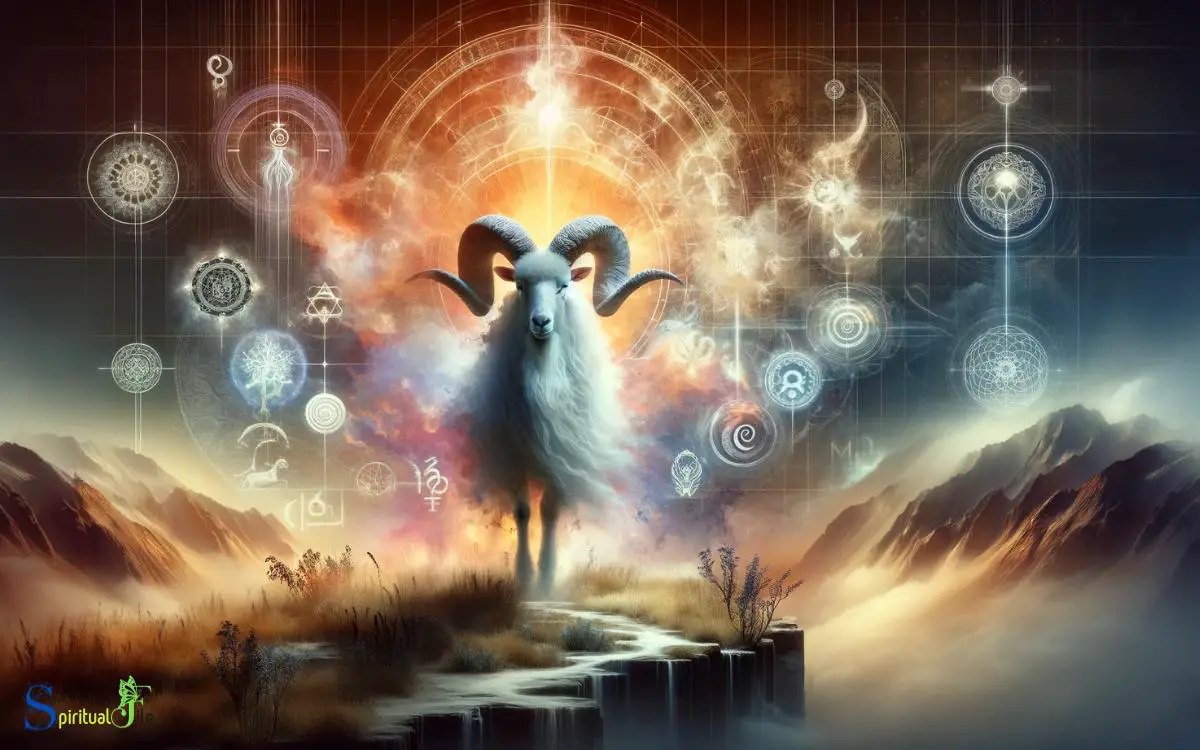
The ram holds significant spiritual symbolism in ancient mythology, representing power, fertility, and leadership in various cultures.
In Greek mythology, the ram is associated with the powerful god Zeus, who took the form of a ram to save Phrixus and Helle. This act symbolizes protection and guidance. Additionally, the ram’s association with the god of war, Ares, signifies strength and courage.
In Egyptian mythology, the god Khnum has a ram’s head, representing creation and fertility. Moreover, in Celtic symbolism, the ram signifies leadership and authority.
The image of the ram is also prominent in Hindu mythology, where Agni, the god of fire, is depicted riding a ram, symbolizing vitality and strength.
Across diverse cultures, the ram embodies spiritual significance, portraying a range of powerful and positive qualities.
Ram Symbolism in Different Religions
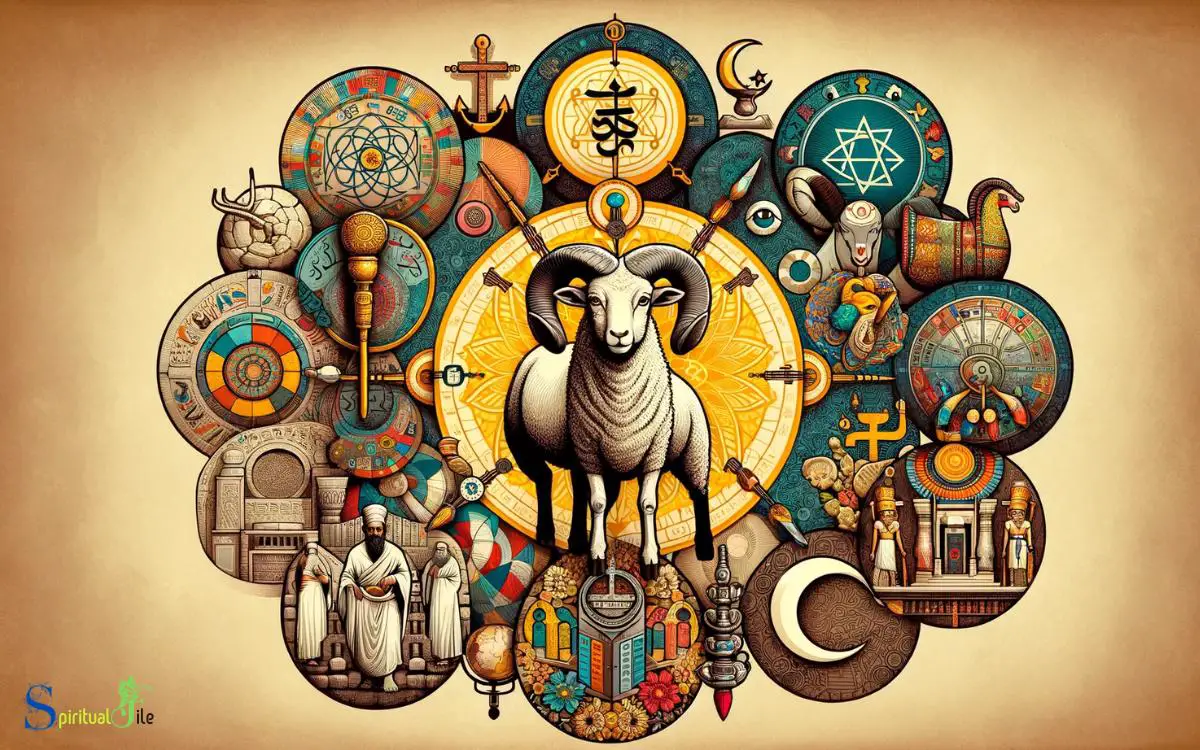
Symbolizing various virtues across different faiths, the ram holds significant spiritual symbolism in religious traditions worldwide.
- In Hinduism, the ram is associated with the deity Agni, the god of fire, symbolizing strength, courage, and leadership.
- In ancient Egyptian religion, the ram was linked to the god Amun, representing fertility and sacrifice.
- In Judaism, the ram is famously linked to the story of Abraham and Isaac, symbolizing obedience and faith in God. Additionally, the shofar, a horn traditionally made from a ram’s horn, holds symbolic significance in Jewish religious ceremonies.
- In Islam, the ram symbolizes the willingness to make sacrifices for Allah’s greater good, as evidenced in the tradition of Eid al-Adha.
Across various faiths, the ram embodies qualities such as strength, sacrifice, and devotion, enriching spiritual understanding and practice.
Ram as a Spiritual Guide

Across different religious traditions, the ram serves as a spiritual guide, embodying qualities of strength, sacrifice, and devotion, guiding adherents towards a deeper understanding of faith and spirituality.
- In Hinduism, the ram is associated with Lord Vishnu, symbolizing strength and perseverance in the face of adversity.
- In Christianity, the ram is linked to the concept of sacrifice, as seen in the story of Abraham and Isaac, where a ram was provided as a substitute for sacrifice.
- In Pagan traditions, the ram represents fertility and the nurturing of new life, guiding followers to embrace the cycle of life and death.
The ram’s spiritual guidance encourages individuals to embody these qualities in their own lives, fostering inner strength, a willingness to make sacrifices for the greater good, and a deep sense of devotion to their spiritual journey.
Ram Symbolism in Dreams
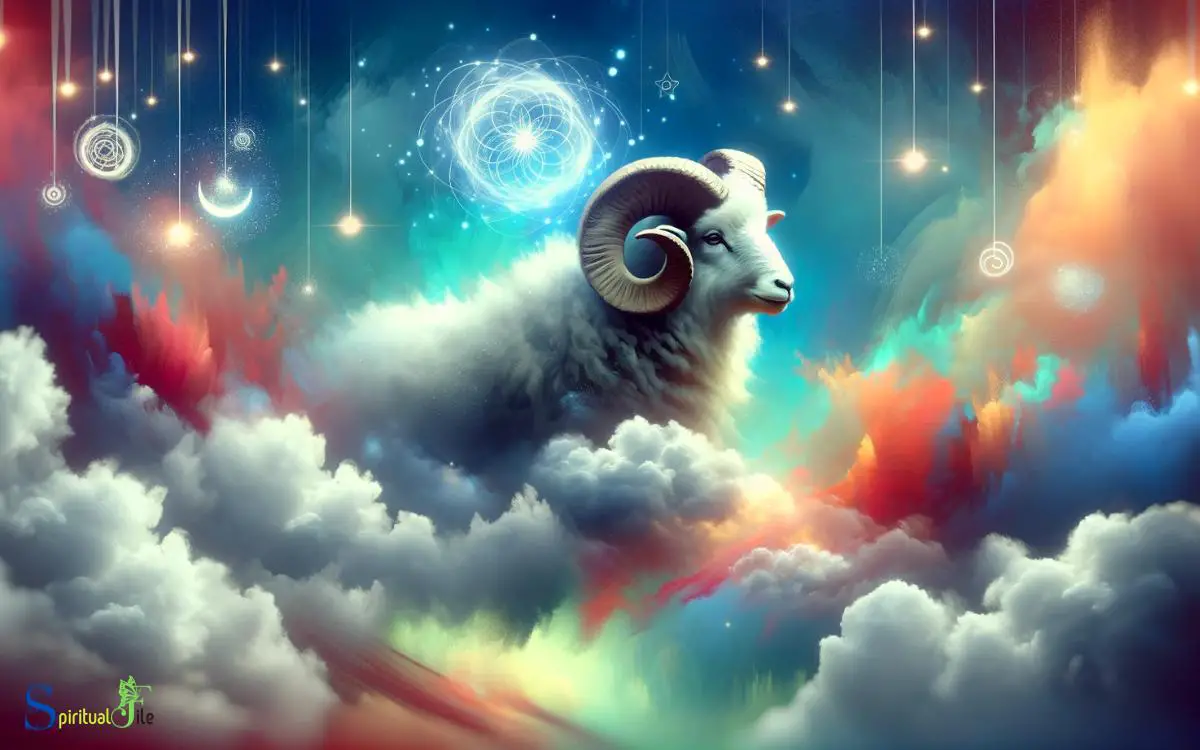
Ram symbolism in dreams reveals subconscious messages and insights into one’s spiritual journey and inner strengths.
Dreaming of a ram often represents power, energy, and determination. If the ram in the dream is charging or butting heads, it may signify the need to confront challenges or assert oneself in waking life.
On the other hand, a peaceful interaction with a ram in a dream could symbolize harmony and balance.
Additionally, the color or condition of the ram in the dream may convey further meaning. Paying attention to emotions and surroundings in the dream can provide valuable clues to the message the ram is conveying.
Understanding these dream symbols can offer guidance and clarification for one’s spiritual path and personal development.
This dream symbolism also ties into the ram’s connection to personal traits.
The Ram’s Connection to Personal Traits
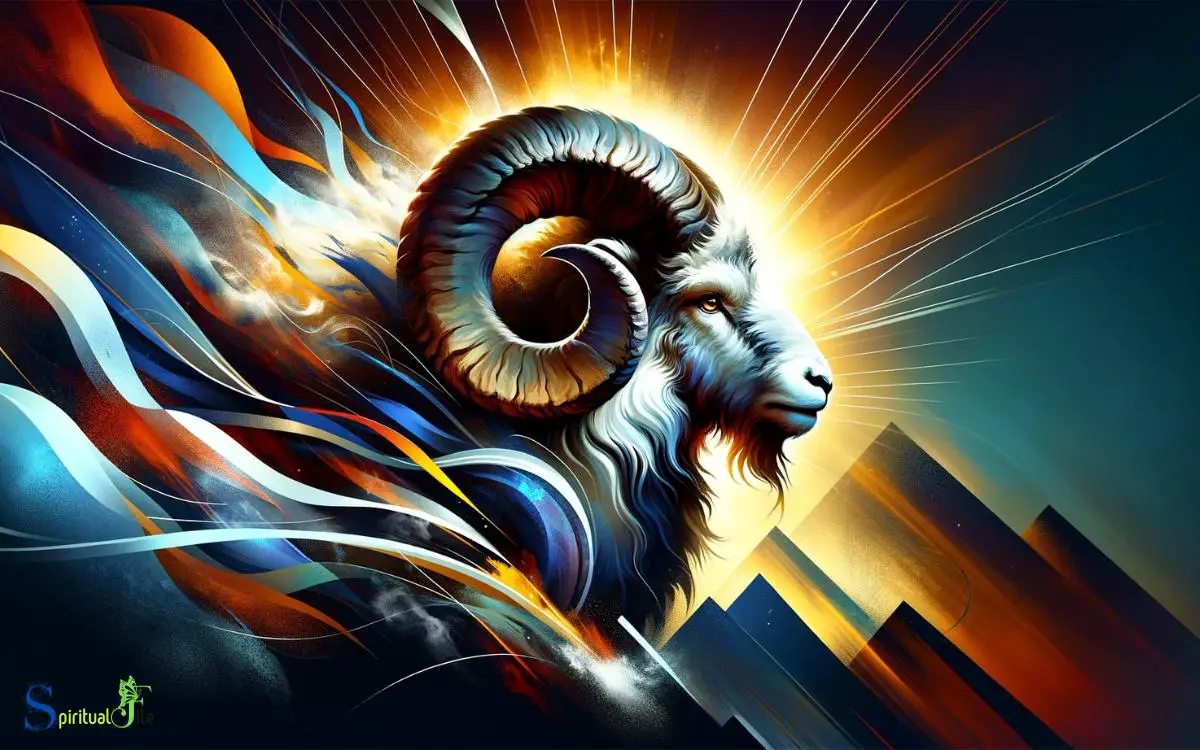
The symbolic representation of the ram extends beyond its spiritual significance to encompass personal traits and qualities. Understanding the connection between the ram and personal characteristics can offer insights into one’s own nature and behavior.
Traits and Spiritual Significance
In spiritual symbolism, the ram embodies strength, determination, and assertiveness, reflecting these qualities within individuals who resonate with its energy.
Those who connect with the spiritual significance of the ram often exhibit the following traits:
- Courage: Embracing challenges with bravery and resilience.
- Leadership: Guiding others with confidence and a strong sense of direction.
- Independence: Displaying self-reliance and a pioneering spirit.
- Vitality: Embracing life with energy, passion, and enthusiasm.
- Assertiveness: Communicating needs and desires with clarity and confidence.
These traits, inspired by the symbolism of the ram, can empower individuals to navigate life’s journey with determination and fortitude, embracing their unique strengths while inspiring others to do the same.
Ram as a Symbol
Embodies strength, determination, and assertiveness, reflecting these qualities within individuals who resonate with its energy, the ram symbolizes courage, leadership, independence, vitality, and assertiveness in spiritual symbolism.
Those who connect with the ram as a symbol are often seen as courageous and determined individuals, willing to take charge and lead by example.
They possess a strong sense of independence and self-reliance, exuding vitality and assertiveness in their actions and decisions.
The ram’s symbolism encourages individuals to embrace their inner strength and stand firm in their beliefs, promoting a fearless approach to life. It serves as a reminder to harness one’s inner power and face challenges with unwavering determination.
Understanding the ram’s connection to personal traits provides insight into the symbolic significance it holds for those who resonate with its energy.
This connection between personal qualities and the ram offers a deeper understanding of its spiritual symbolism.
Personal Qualities and Ram
Frequently, individuals who resonate with the energy of the ram symbolize courage, leadership, independence, vitality, and assertiveness in their spiritual journey, reflecting these qualities within themselves.
- Courage: The ability to confront fear, pain, danger, uncertainty, or intimidation.
- Leadership: The capacity to guide, direct, or influence people.
- Independence: The state of relying on oneself and being self-sufficient.
- Vitality: The exuberant physical strength and mental vigor.
- Assertiveness: The confident and self-assured expression of one’s needs, desires, and opinions.
Understanding the personal qualities associated with the ram can provide insight into one’s own spiritual journey and the traits they may need to nurture.
These qualities are foundational in the rituals and ceremonies involving rams, further enhancing the significance of their symbolism.
How Does the Spiritual Symbolism of Bats Compare to That of Rams?
The spiritual symbolism of bats is often associated with rebirth and transformation. In many cultures, bats symbolize spiritual rebirth, guiding individuals through the darkness of their past into the light of a new beginning. In contrast, the symbolism of rams often represents strength, courage, and perseverance in the face of challenges.
Rituals and Ceremonies Involving Rams
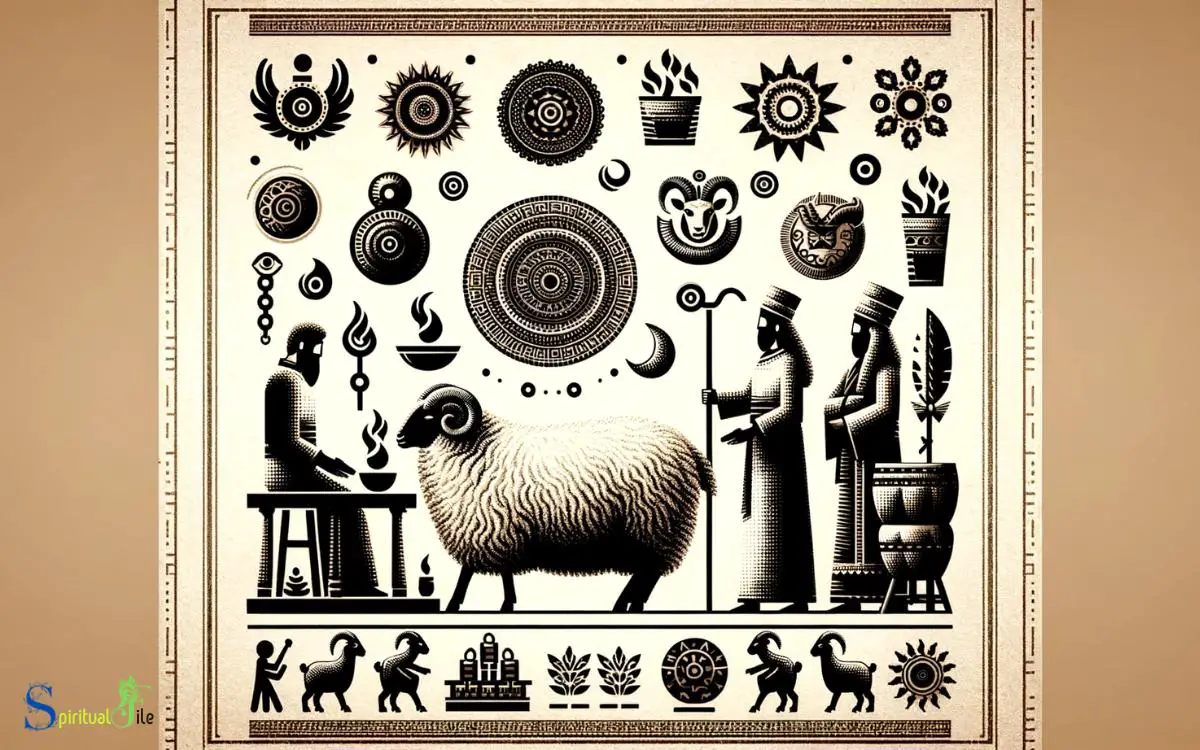
Rituals and ceremonies involving rams have deep spiritual significance in many cultures. From symbolizing purity in religious rituals to being used as sacrificial offerings, the ram plays a central role in various ceremonies.
Understanding the symbolism and spiritual significance of rams in these rituals provides insight into the cultural and spiritual beliefs of different societies.
Symbolism in Religious Rituals
In religious traditions, a significant number of ceremonies and rituals incorporate the symbolism of the ram as a representation of power, sacrifice, and divine connection.
The presence of rams in religious rituals holds deep symbolic meaning and significance, conveying profound messages to the participants and observers.
These rituals and ceremonies involving rams serve to evoke a range of emotions, including:
- Awe and Reverence: The powerful and majestic nature of the ram symbolizes the awe-inspiring presence of the divine.
- Humility and Surrender: The act of sacrifice involving a ram can evoke feelings of humility and the willingness to surrender to a higher power.
- Strength and Resilience: The ram’s physical strength and resilience can inspire feelings of courage and determination.
- Connection and Communion: The ritualistic use of rams can foster a sense of connection and communion with the divine.
- Redemption and Renewal: Symbolizing sacrifice and rebirth, the ram can evoke emotions related to redemption and renewal.
Ram as Sacrificial Offering
The symbolic significance of the ram as a sacrificial offering in religious rituals and ceremonies is deeply rooted in its representation of power, sacrifice, and divine connection, evoking profound emotions and messages for participants and observers.
Rams have been used in sacrificial rituals across various cultures and religions, symbolizing the ultimate act of devotion and obedience to a higher power.
The act of sacrificing a ram is seen as a demonstration of surrendering worldly desires and ego, embracing humility, and seeking divine favor.
The offering of a ram is believed to symbolize the transfer of sins or negative energies from the participants to the animal, thereby purifying the individual and the community.
Through this ritual, participants aim to strengthen their spiritual bond with the divine, express gratitude, seek blessings, or atone for wrongdoings.
Spiritual Significance in Ceremonies
A significant number of religious and cultural ceremonies involve the symbolic inclusion of rams, highlighting their spiritual importance and enduring relevance.
The presence of rams in these rituals and ceremonies holds deep spiritual significance, representing various ideals and beliefs across different traditions.
Some of the emotional and spiritual aspects associated with ceremonies involving rams include:
- Sacrifice: Rams symbolize the willingness to make sacrifices for spiritual or divine purposes.
- Renewal: The inclusion of rams in ceremonies signifies the opportunity for spiritual rebirth and renewal.
- Strength: Rams embody the qualities of strength and resilience, inspiring worshippers during ceremonies.
- Abundance: Their presence symbolizes blessings and abundance in spiritual contexts.
- Connection: Rams are seen as intermediaries between the earthly and spiritual realms, fostering a sense of connection during ceremonies.
Conclusion
The ram symbolizes strength, leadership, and determination in various spiritual and cultural contexts. Its significance in ancient mythology, religious symbolism, and spiritual guidance highlights its enduring relevance as a symbol of power and resilience.
The ram’s presence in dreams and its connection to personal traits further emphasizes its spiritual significance. Through rituals and ceremonies, the ram continues to play a significant role in guiding individuals on their spiritual journeys.





